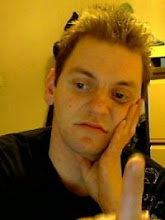Monday, 15 November 2010
And Now For Something Completely Differentish
I did mention when Northernbloke kicked off in February, that there would be reviews and similar kinds of stuff alongside the Mail bashing, but I feel this bit is neglected somewhat. I won't say it is because of any circumstances out of my control, more a case of I just forgot, or more likely I was just too lazy to be arsed writing the bloody things in the first place. But as I've been catching up on 4oD on youtube (that explains a dearth of posts) I have a few things I'd like to put up in response to the documentaries I've watched. It's like a break from having to root around the Internet to debunk a Littlejohn story about how a traffic warden bazookad a puppy with a RPG for walking over a double yellow line, the kind of stuff even Smiffy of the Bash Street Kids could instantly detect as 24 carat bullshit. So hopefully the line up should be:
1. Review of Martin Durkins "Britain's Trillion Pound Horror Story"
2. Response to a youtube video about the morality of the Prime Directive on Star Trek. (hopefully not as geeky as it sounds.)
3. Review of Ben Steins "Expelled"
And the to do list involves:
1. Reviews of really bad Star Trek episodes.
2. (Possible) Review of Niall Fergusons "War of the World.", not entirely given this the green light.
How exciting.
Monday, 12 July 2010
Michael McIntyre is Overrated
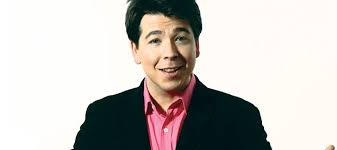 I'd never seen any of Michael McIntyres stand up routines before the end of last week. I knew about him of course;- his meteoric rise to success in the last few years. Endless coverage on "Live at the Apollo", well perhaps not as much now. But perhaps most intriguing of all was his controversial status amongst other stand ups, from Frankie Boyle, to Vic and Bob, to Stewart Lee. Was it sour grapes on their behalf? Were they justified in saying that his act was bland and always playing it safe? Or was McIntyre a true popular comedy talent who was the victim of sneering snobbery? (nb, I don't think any of the detractors I have named are comedy snobs. Lee is perhaps my favourite stand up of all. I too follow the values of the Carphone Warehouse.) Well I watched some of his "Apollo" stuff, and his tour thingy, and he .. just .. isn't funny. I couldn't laugh at any of it. His line about a sin bin sounding like a Catholic skip was about his funniest, and that wasn't even funny really.
I'd never seen any of Michael McIntyres stand up routines before the end of last week. I knew about him of course;- his meteoric rise to success in the last few years. Endless coverage on "Live at the Apollo", well perhaps not as much now. But perhaps most intriguing of all was his controversial status amongst other stand ups, from Frankie Boyle, to Vic and Bob, to Stewart Lee. Was it sour grapes on their behalf? Were they justified in saying that his act was bland and always playing it safe? Or was McIntyre a true popular comedy talent who was the victim of sneering snobbery? (nb, I don't think any of the detractors I have named are comedy snobs. Lee is perhaps my favourite stand up of all. I too follow the values of the Carphone Warehouse.) Well I watched some of his "Apollo" stuff, and his tour thingy, and he .. just .. isn't funny. I couldn't laugh at any of it. His line about a sin bin sounding like a Catholic skip was about his funniest, and that wasn't even funny really.Saturday, 26 June 2010
I Can't Join in the "St. John" Line
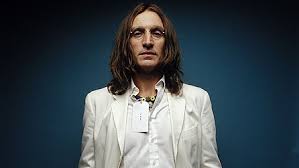 John Lennon is one of the last century's most well known cultural icons. The Beatles, the bed ins, the granny glasses and the long hair. Pretty much everyone knows who he is, and of course he receives the customary (posthumous) adulation that this level of fame brings, which is a lot. His advocacy of the peace movement that formed in his lifetime due to fall out from; amongst other things the Vietnam war and the harsh backlash to the civil rights movements has cemented him in the eyes of his fans, as one of the key figures of the time. Songs like "Give Peace a Chance" and "Imagine" in particular have become almost secular hymns in their own right. I'm even sure the Jesus like long hair, and the white suits and robes played their part in his almost saintly mythos. I had a first hand experience of the St Lennon phenomenon at a "Bootleg Beatles" concert at the Manchester Apollo a few years ago, on the anniversary of his death. The renditions of "Imagine" and his Christmas tune, accompanied with his portrait had the feel of a quasi religious eulogy. In a way this is understandable on some levels. Lennon's senseless death was a genuine tragedy, and such a waste of a genuine talent. There is a grim irony that such a vocal advocate of peace was violently gunned down in the street. But as I thought when I saw this, and when I watched a BBC4 drama about Lennon, from when Brian Epstein killed himself to Yoko and him moving to the US, Lennon really wasn't an angelic figure. If you see past his genuine talent, and the good (as well as dodgy or naive) causes he espoused, he was a man, and a flawed one at that.
John Lennon is one of the last century's most well known cultural icons. The Beatles, the bed ins, the granny glasses and the long hair. Pretty much everyone knows who he is, and of course he receives the customary (posthumous) adulation that this level of fame brings, which is a lot. His advocacy of the peace movement that formed in his lifetime due to fall out from; amongst other things the Vietnam war and the harsh backlash to the civil rights movements has cemented him in the eyes of his fans, as one of the key figures of the time. Songs like "Give Peace a Chance" and "Imagine" in particular have become almost secular hymns in their own right. I'm even sure the Jesus like long hair, and the white suits and robes played their part in his almost saintly mythos. I had a first hand experience of the St Lennon phenomenon at a "Bootleg Beatles" concert at the Manchester Apollo a few years ago, on the anniversary of his death. The renditions of "Imagine" and his Christmas tune, accompanied with his portrait had the feel of a quasi religious eulogy. In a way this is understandable on some levels. Lennon's senseless death was a genuine tragedy, and such a waste of a genuine talent. There is a grim irony that such a vocal advocate of peace was violently gunned down in the street. But as I thought when I saw this, and when I watched a BBC4 drama about Lennon, from when Brian Epstein killed himself to Yoko and him moving to the US, Lennon really wasn't an angelic figure. If you see past his genuine talent, and the good (as well as dodgy or naive) causes he espoused, he was a man, and a flawed one at that.Monday, 17 May 2010
Knighted for Laughing at Mingers

Tuesday, 11 May 2010
TV Review. Derren Brown Investigates. The Man Who Contacts the Dead. (C4)
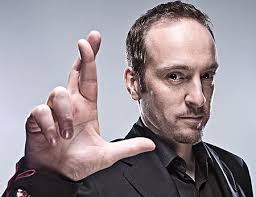
Derren Brown Investigates, does what it says on the tin. The mind boggling (how the hell he does what he does, I don't know. I suppose that's the point) conjurer follows a bald headed Liverpudlian psychic called Joe, in order to ascertain the validity of his claims about being able to contact the spirit world (and apparently John Lennon himself). Joe, self evidently regrets agreeing to the documentary, being chippy and evasive throughout, not being able to feign his contempt for the whole thing. We see Joe in action at a one to one reading or whatever they call it with a women. Surprisingly he gets some details right about the women's relatives who have "passed on." (more on this later.) Brown probes him on how he does it, and Joe claims its to do with energy transfers and and magnetic fields and what not. I imagine several physicists exploded in their front rooms at this point. Brown says it would be an astounding achievement if he really could contact the dead, and the concept is potentially staggering. How plausible that he can contact the dead is another matter completely.
They both try out (though Derren is reluctant to do so. He is emphatic, he has no psychic ability. He's a conjurer.) their ability on some Hollyoaks stars. On one girl; they deduce where she went on holiday, and what car she owns. Joe is irked that Derren can beat him at his own game, and is quite rudely dismissive of him (he is rather grating), claiming his readings have more factual basis. In a twist on this reading, Derrens driver claims that Joe might know she drives a Mini, as he was stood outside the car park when she pulled in! (Joe angrily denies this.)
Derren then sees Joe perform at a "Psychic Night" gig at a hotel, alongside a researcher into the practices of psychics. He explains "cold reading", whereby a person can use visual and vocal clues to fish for information about a stranger, ostensibly knowing more about them than they actually know. He analyses the use of abstracts;- random names to garner a reaction from the audience to establish a "grip." We see how the audience (who are almost all women, and credulous to his "abilities".) fill in the gaps for him, interpreting random numbers and names as related to their "spirit". How he dismisses stuff he gets wrong, and can shoehorn unrelated "hits" to form a narrative. So - called Barnum statements, general descriptives that can apply to anyone (something for everyone.). In fact one of the things I liked about this documentary was that you could see these in the other readings. Your mums happy in heaven (What else would people want to hear? She fucking hates it?) Old women suffer from joint problems. Hollyoaks girl is told her last relationship ended in heartbreak (what else was it going to end in? A merger with Tesco.) We also see him recap stuff relayed to him earlier, that he puts back out as "readings". And if all else fails, he blames any errors on "bad spirits", audience error, and bad vibes. Never the fact that he's either a shit psychic, or he isn't psychic at all. I never!
The researcher concedes that a casual observation can't prove / disprove his abilities alone. He will have to undergo some kind of test under controlled conditions. He (vigourously) refuses to take a controlled test, in which he never has face to face contact with his "customer" to rule out cold reading, - in order to give them messages from the spirit world. His rationale is lousy, he needs to see the person in order to send the celestial text message; or something. Derran accurately says this is like a bloke saying he has a UFO in his back yard, but it's invisible and intangible, so just take the blokes word for it. A pre arranged test takes place when a women who wants a reading off Joe, from a specific person (her sister) fails totally. He can't get anything right at all. He is outraged to find that she was approached beforehand (why didn't the spirits warn him.) and claims that Derren scared the spirits off. (the blame game.) He terminates the meetings after that.
Things like this are frustrating to watch sometimes. Joe is so evasive, and so full of weasel words, we end up with a one sided affair. (If you want to justify the tenacious, at least have a crack at doing so.) He can't justify the foundations of his ability, because the foundations simply don't exist in the first place. By his own admission we can't try to apply some kind of controlled conditions to evaluate his "powers" because the controls invalidate them by default. (This is a common qualm from homeopathists and alternate medicine people as well.) All we are left with is his word for it, and like the famous Carl Sagan quote "extraordinary claims need extraordinary evidence", and the "that which can be ascribed without evidence, can be dismissed by evidence" leaves us with only one conclusion you don't have to be psychic about.
Some might say that if people are credulous enough to part with cash for this kind of thing, then so be it. But I always feel that this is far from victimless. There are real human emotions being trampled on by this sort of stuff. The night in the pub for instance. Liverpool has its fair share of social baggage. There was talk of drug deaths, alcohol deaths and suicides. There was something terribly intrusive about the whole thing. I don't really blame someone who lost a loved one, grasping at straws. The ability to contact the dead would bring comfort to many who felt they didn't get to say goodbye. But fake catharsis (that they've paid for.), on such tenuous evidence? Which leads us onto the conclusion of Joe's "abilities" It later transpires that the successful reading he had (the one I said I'd mention again.) was a neighbour of his sister. I'm not psychic but;-..... And if I'm honest I don't think Joe is either.
Monday, 26 April 2010
Oh Look Joan Collins is Bitching About Horrid Modern TV. (Like thats new.)

Collins latest masterpiece is a usual "ex luvvie gripes about how "hard" it is to be an actor, and how TV ain't what it once was. Just a mix of guns, swearing and sex. Though on her wikipedia page it says she is starring in a film called "Fetish" this year, so make what you will of that. She then waxes starry eyed lyrical about staying in posh hotels in Hollywood, whilst watching films and rubbing shoulders with Liberace (Liberace! This from a women who says modern actors are sex obsessed for Gods sake.) and his lovely false teeth (no really). Yeah it sounds a right fucking graft Joan. Sign me up! Then we hear the charming tale about how she fantasised about being Loretta Young when she was playing Alexis in Dynasty. I mainly fantasise about pills and whisky in my job Joan. Then there's the usual reality TV bashing these articles inevitably descend into.
I have three gripes about the article itself. Firstly Collins seems to think she's a really big star when she isn't. She was just someone in "If it's Tuesday. This Must be Belgium." "Can Hieronymus Merkin Ever Forget Mercy Humppe and Find True Happiness?" that Flintstones film and "Empire of the Ants." Severe chutzpah overload, but that's nothing new with actors. Secondly she -and this is a pet peeve here;- thinks acting is "hard work", a nurse wiping senile peoples bums is "hard work." or construction workers building stuff in all weathers is "tough graft". Being paid a zillion pounds to wear a silly wig and read a script, having loads of fans, and getting pissed at the Oscars isn't quite in the same league. Thirdly, she isn't really bothered about the "coarseness" of stuff like "Britains Got Talent". That would be to miss the point. She, like many actors of that generation, doesn't want the likes of us to get our boots into that most exclusive of clubs, fame. Yeah those kinds of shows are a bit tacky, and I have questions about how much of this kind of thing is just laughing at weirdos. But it's not surprising that lots of regular people want to be famous. Most jobs are rubbish. It's no fun working for a sexually frustrated middle manager called Barry, on the accounts department at Telford World of Polystyrene. It is, if you are getting paid to stay in nice hotels, and have people wanting your autograph. Joan Collins knows this, and she can bullshit her way around saying how hard it is the "fame game" when it isn't. Because in the end, she just wants her in and us lot out.
It's also kind of ironic that she says people seem to have no dignity on these shows in their quest to get famous. Some women got her tits out or something on BGT. But most of these actors will literally jump through hoops to get higher levels of fame. They can talk all the like about the "glamour" and "dignity" of showbiz. Most thesps would pull their trousers down and take up a squatting position in the big top of a packed out circus whilst a dozen dwarves dressed as clowns took it in turns to kick their bare arse cheeks for comedic effect, if they thought it would re-kindle their career. I am sure Joan Collins would dress up as a giant comedy parrot (with her making comedy squawks and "pieces of 8" noises to add to the illusion)to accompany the guy dressed up as a sailor in the admiral car insurance advert, if she thought she would hit the big time, she never actually really hit. That should give you a hint about how much of a "hard life" this acting business is.
Wednesday, 14 April 2010
BBC's "Survivors" hasn't survived the chop.
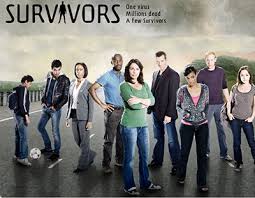
Survivors had a great premise, wipe out just about every human being with a virus, and see how a bunch of "normal people", and others try to eke out a living, with all the comforts and familiarity they took for granted totally stripped away. It's the classic eschatological; fantastic fish out of water - scene setting; that sci -fi writers are so keen to utilise, and when well done it's an ideal environment for a good bit of sci-fi.
Perhaps because I purchased a copy of Alan Weismans. "The World Without Us." , that despite a promising start, the series never capitalises on the premise of this new, nearly post human world (which, the human part would fall apart very quickly, as "World" describes"), in some of the rural scenes, apparently the end of mankind, will be a bit like having a rubbish camping trip, with no one about, and no electricity. Hmmm. The good, apocalyptic sci fis, like the first episodes of the newer "Battlestar Galactica" and Stephen Baxter's novel, "Flood" manage to convey the dire (and unusual) situation these people face, in their now destroyed worlds, in the context of keeping it with a tight character piece. Survivors doesn't do this. The show had an aimless quality, where the characters more often than not, encountered the dull plot of the week, and everything would be fine by the credit roll. There was little scope to see how society adopts to this new world. Indeed when they discovered a colony set up by the highest surviving government official, they fled it due to the harsh rules, so in a way the series ducked the bigger questions of how a new order would be built, in exchange for our characters walking around the Peak District, pretending to be in an apocalyptic wasteland.
Wednesday, 24 March 2010
TV Review. Michael Portillo. Power to the People.
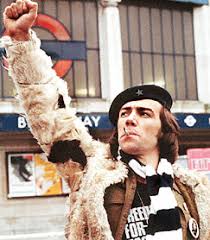 WATCH DOCUMENTARY HERE.
WATCH DOCUMENTARY HERE.
As I said the documentary made clear that People power could become populism by any other name, and two controversial examples of this in practice are the Mayor of Doncaster. Peter Davies (pictured), and Joe Arpaio; the so called "Americas Toughest Sheriff" (you'll probably have heard about the prison camp in the desert he set up where the inmates have to wear pink boxers.). Davies, the English Democrat elected mayor of Doncaster is the bluff talking Yorkshireman archetype, a staunch and vocal plain talking right winger on most issues (e.g PC, out of EU, pro capital punishment.) He is known for his attempts to trim council spending by cuts including his own salary, stopping gay pride funding, and getting rid of PC "non jobs" (though I suppose ironically he would have to spend money in order to create a bureaucracy that deed what was a "non - job".) He has also, even more controversially attempted to cut spending for translation services to new immigrants and established non - English speakers in order to get them to improve English (I can't help think this is like banning Weightwatchers to cut obesity. Are they supposed to read an Oxford dictionary really quickly?) The film does point out (as does a local women) that he doesn't have the mandate as mayor to pull off a lot of what he wants, and that some of it may just be saloon bar politics. Joe Arpaio elected Sheriff of Maricopa County, Arizona is an even more controversial example of what people power could bring if police chiefs were democratically elected. He is still popular (but popularity falling) for his ultra hard line policies, but we hear that he is controversial for his treatment of illegal immigrants and from Hispanics who claim he singles them out in particular. One man claims to have been badly beaten by his men for a trivial crime. This is one area I'd be wary of a democratic head. Law enforcement is both emotive and a complex body. We hear from a British chief constable that it could result in complex murder and terrorist monitoring resources being shifted away to popular but limited crime prevention methods like high profile beat based policing. I also think it runs the risk of a police chief under pressure to conclude a high profile case, to get results to satiate public opinion. It would have helped to see how affective Arpaios methods were in recidivism and crime reduction, but we didn't so we have little to go on in that regard, a running problem with the documentary.
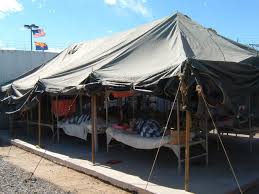
All in all the documentary (even though it was edited a little to much to give a really big picture.) confirmed my belief that decentralising powers away from Westminster and giving local powers back to local government is a step in the right direction. There is a lot of bean counting goes on in local councils, and my own town of Bolton has suffered from this. Our thriving Market Hall and its independent small shops were revamped as a small shopping mall in a greatly unpopular move that was supposed to put Bolton more in line with Manchester. I think it was a bad decision that has harmed the town. Why would someone pay good money to park in Bolton, when they could go to a mall with free parking that's 20 times bigger in Trafford? I can't help think that an elected mayor, and a more active council with the ear of public opinion could have stopped this from happening. As for whether we would end up with loads of Peter Davies style mayors? The program showed that people when given the opportunity to influence things this way, that they can be quite focused about it, and can learn political process (sadly lacking in the greater public.). Doncaster also happened after the huge corruption that council has had and the expenses so Davies could capitalise on increased populist sentiment (again the documentary is reticent on how popular he actually is.) during unusual circumstances, rather than what would be the norm. He is also limited in the greater social context of his more dodgy ideas, so the pitfalls of this are reduced. But it seems give the public a stick up to local policies, and they seem to take it willingly. Power to the people then.
Postscript. Peter Davies has really been quite low profile as Mayor, he hasn't been as controversial as I thought. I'd imagine he's having trouble putting his money where his mouth is, on the some of his saloon bar talk. This hunch is highlighted by this brilliant interview he has with Toby Foster (aka that guy of Les Alamos on "Phoenix Nights" which shows how depressingly low rent he is. Perhaps showing him up like this will let people be turned away from simple populist tub thumping. Heres Hoping!
